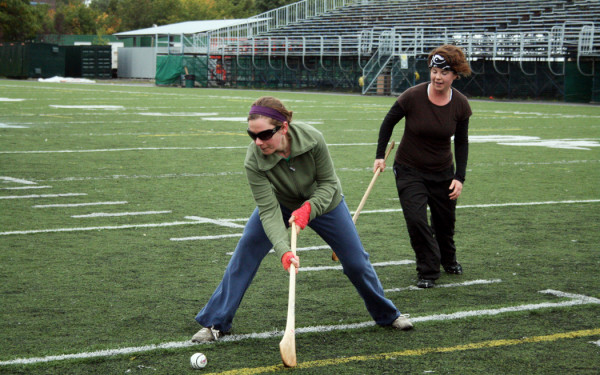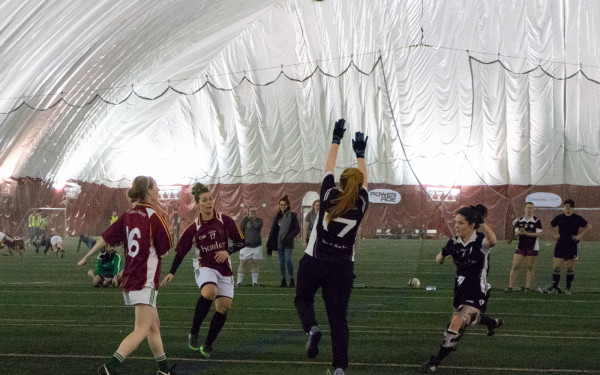Let The Gaelic Games Begin
Visiting Irish Scholar Set to Begin First-Ever Gaelic Athletic Association Club at Concordia
Formed in the 19th century, the Gaelic Athletic Association has over one million participants worldwide and features numerous Irish sports, including Gaelic football and hurling. Both sports are huge hits in their native country of Ireland and games are played in front of tens of thousands of fans.
These numbers dwarf the 10-15 Concordia students who attended the first meeting of “Na hÓglaigh Ollscoile” or the Gaelic Athletic Association club this past Wednesday. However, it’s a stepping-stone in the hopes of becoming the first GAA to operate out of a Canadian university.
“In the last five or six years, the GAA have been promoting Gaelic games in American universities so they have national competitions for university clubs,” said Daithí Mac Fhlaithimh, a visiting Irish scholar at Concordia’s School of Canadian Irish Studies.
“When I was looking across all of these Canadian universities, [I thought] there are these fantastic projects going on in America, why not in Canada?”
Fhlaithimh is spearheading the development of Concordia’s first-ever GAA club, with an emphasis on promoting hurling and Gaelic football. According to their club proposal, the volunteers wish to eventually develop four teams—two male and two female teams of Gaelic football and hurling.
Montreal has three Gaelic football clubs that each play in the Montreal Superleague: the Verdun Vikings, Griffintown Gaels, and the Goose Village Black Rocks. The Volunteers intend on joining the league, meaning they’ll become the fourth team in the Superleague.
Recognized as Ireland’s most popular sport, Gaelic football brings together elements of soccer, rugby, handball, volleyball and even basketball. 15 players per team aim to score on a net, or through uprights with the aid of hand-passes, kick-passes, kicks and catches.
Hurling, seen as “the fastest game on grass,” is a game that is over 3,000 years old. Players use a wooden stick, or hurley, to hit a small leather-covered ball, known as a sliotar, into a goal.
“[Hurling] feels like it’s something special,” said Fhlaithimhi. “For me anyways, there’s spirituality playing hurling because of the history. Three thousand years of your kin playing this sport. I think that’s unrivalled, maybe with Native Americans here playing lacrosse. In European terms, it’s unmatched.”
Back in Ireland, most players of Gaelic football and hurling do not play the sport for a living. Most players, even play-by-play commentators, have regular day jobs such as teachers, bankers and even military personnel.
“They all go back to their job on Monday morning after playing in front of 80,000 people on Sunday,” said Fhlaithimi. “They’re your average Joe Soap.”
In addition, players represent their own parishes and counties out of pride as opposed to more money-driven athletes elsewhere who, in turn, have more freedom to play wherever they feel.
“It’s to do with the fact that [the GAA] is a community-based organization,” Fhlaithimhi added. “It’s about representing your family, where you come from and basically your own local area.
“There’s a fear if it does become professional, you’ll have big counties like Dublin with huge populations attracting players from counties all over the country. Then it becomes not about where you’re from, or representing your family or parish or your people, and more about money.”
This past Saturday afternoon, assisted by the Montreal Shamrocks, a local GAA club and Team Quebec players, a Gaelic football practice for beginners took place at the Stinger Dome on the Loyola campus, followed by a scrimmage.
The majority of attendees were interested in Gaelic football, as opposed to hurling, yet all had to adjust to the learning curve of a new sport.
“This is my very first day [playing Gaelic football], ever,” said Irish Studies student Morgan Kleinsasser. “I keep tossing it up to set it, like volleyball, and you can’t. You have to hold it in your hand and hit it.”
“It’s a lot of fun,” said Irish Studies student Patrick Mayers. “You come here, [the coaches] show you the ropes, and it doesn’t matter if you suck right away or if you’re good. Everybody’s just welcome to play and have a lot of fun.”
The Volunteers plan on holding monthly practices according to their proposal and will offer more training sessions as the conditions get warmer. The Volunteers plan on playing their first game in the Superleague in March.
For more information on The Concordia Volunteers, check out their Facebook page: https://www.facebook.com/ConcordiaGAA and email them at: concordiagaa@gmail.com or register.concordiagaa@gmail.com
Video by Elysia-Marie Campbell

_600_832_s.png)



__thumb_600_375_90_s_c1.JPG)
